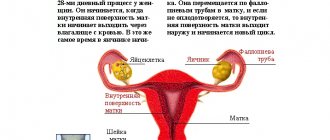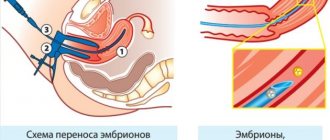Menstruation for a woman is always a source of various experiences and worries. They were delayed or started earlier than expected, did not go as usual, and so on. But perhaps the most worrying thing is when menstruation lasts longer than expected.
What determines the duration of menstruation?
Possible causes of prolonged menstruation
Other reasons
What to do if you have a long period?
Examination for prolonged menstruation
Postpartum periods
In fact, this is not considered a period. It would be more correct to call it postpartum hemorrhage. Its duration is individual and depends on the woman’s condition.
Most often, the first two weeks after childbirth are accompanied by heavy bleeding, which gradually decreases. Moreover, the last discharge changes color - it becomes yellowish-brown. Many women feel aching pain in the lower abdomen while breastfeeding. This is a natural process of contraction of the uterus and does not pose any threat.
On average, bleeding after childbirth lasts almost a month. Due to heavy discharge, a woman loses a lot of iron. To avoid anemia, it is advisable to keep your hemoglobin levels under control. If necessary, take a course of iron supplements.
After the bleeding stops, the next menstruation may occur in a month, or may not begin at all while the woman is breastfeeding her baby. The absence of menstruation during lactation is in no way a method of contraception.
https://youtu.be/Vez-Qf3t-SM
Causes
When your period doesn't end, the reason is the first thing to find out. Only based on the results of the examination, the doctor will be able to prescribe adequate treatment.
Let's consider a number of factors that can explain why your period doesn't end.
Hormonal imbalance
Violation of the correct balance of hormones in a woman’s body can occur for a number of reasons, both internal, natural, and external.
Problems with hormonal balance can begin in the following situations:
- Adolescence . During this period, puberty occurs and the formation of the menstrual cycle, which at the initial stage is far from regular. The duration of the cycle itself, as well as the duration of critical days, can jump from minimum to maximum values.
- Pregnancy and postpartum period. The reason is serious changes in the body. First, the body adjusts to bearing a baby, then it returns to normal. All this is accompanied by changes in the concentration of certain sex hormones.
- Premenopause and menopause (or menopause). Everything here is explained by the natural decline of reproductive function, the cessation of ovulation and hormone production.
If menstruation does not end at one of the above stages of a woman’s life, then this is a variant of the norm. In other cases, you should contact the clinic.
Hormonal contraception
When taking contraceptives, the functioning of the reproductive organs may also change. OCs not only prevent unwanted pregnancy, but can affect the duration of menstruation.
At the beginning of taking the drug, periods can be either excessively short or long. If after several months the cycle has not returned to normal, the solution is to contact a gynecologist and select a different contraceptive.
IUD or intrauterine device
This type of contraception is convenient and affordable, and at the same time reliable and effective.
However, there are side effects, one of which is heavy and prolonged menstruation. If your period does not end for a long time after the IUD is inserted, it is likely that there is an individual intolerance and the IUD will have to be removed.
Uterine fibroids
Uterine fibroids are a benign tumor localized in the muscular tissue of the uterus. The pathology is typical for the body of women of reproductive age who are faced with the problem of hormonal imbalance.
One of the symptoms of fibroids is menstruation, which does not end for a long time, as well as uterine bleeding.
Endometriosis
Another gynecological pathology, which is characterized by the growth of the inner layer of the uterine cavity - the endometrium, onto the tissue of other organs.
Symptoms of endometriosis are prolonged menstruation, pain in the lower abdomen and severe manifestations of PMS (premenstrual syndrome).
Endometriosis
Endometrial polyp
Endometrial polyp is a formation on the endometrium, the inner layer of the uterine cavity. The reason is the same hormonal imbalance. The symptom is menstruation that does not end for a long time.
Endometrial polyp
Malignant formation
In some cases, the answer to the question of why menstruation does not end may be the presence of oncology. A malignant tumor affecting the reproductive organs often manifests itself in the form of prolonged bleeding.
Such a diagnosis is terrible, but today it is not a death sentence. There are radical methods that can save a woman’s life if she consults a doctor in a timely manner and identifies the pathology. Therefore, it is so important not to postpone a visit to the doctor if there are signs of a malfunction in the body.
Thyroid diseases
A malfunction of the thyroid gland is always associated with a disruption in the normal synthesis of hormones. There are either too many of them in the body or, on the contrary, not enough.
In both situations, the consequence may be disruption of the regularity of the cycle and prolonged periods. If there are problems with the thyroid gland, consultation with an endocrinologist is required.
Blood diseases
Some blood diseases associated with a decrease in the number of platelets lead to decreased blood clotting. For this reason, normal menstruation can transform into prolonged and intense bleeding.
If problems with menstruation began precisely because of blood diseases, then the woman also has other symptoms, for example, increased bleeding of the gums.
Stress
Stressful situations cannot be excluded from the list of factors that provoke menstrual irregularities. Constant fatigue, lack of proper rest, emotional tension, stress - all this leads to disruption of the normal functioning of the reproductive system.
Intrauterine device
This method of contraception is very popular due to its simplicity and convenience. Having inserted the IUD, a woman forgets about contraception for several years. A problem may arise when, for some reason, this method is not suitable for a woman. If after installing the IUD your period lasts for about a month, this indicates that the body is rejecting the IUD. In this case, it is better to choose another method of contraception.
An IUD taken out at the wrong time often causes long periods.
Diseases that cause heavy periods
If the above factors and reasons are not your case, then we may be talking about a potential disease that provokes a long cycle. Prolonged periods may occur due to:
If menstruation lasts a long time and is abundant, but is a side factor in the development of another disease, for example, anemia, the gynecologist will prescribe tests and send you to a highly specialized doctor who will deal with the true cause of the disease.
Oral contraceptives
Birth control pills can also cause your periods to be longer than expected. This is how the body adapts to oral contraceptives. For several months after first taking the pill, you can expect any surprises in your menstrual cycle. You need to be wary if this condition lasts longer than two months.
In any case, both with the spiral and the tablets, the attending physician should be informed of all changes in the female body.
https://youtu.be/92RoFZ3Y1zA
Traditional medicine recipes
Menstrual irregularities are not treated on their own. In order to eliminate this phenomenon, it is necessary to eliminate the pathological causes of its occurrence, and therefore seriously engage in the treatment of the underlying disease. When the cause is eliminated, the menstrual cycle quickly stabilizes. The only exception is if there is excessive bleeding. In this case, it is necessary to take hemostatic drugs, but only as prescribed by a doctor. The most popular in this direction are Dicynon and Vikasol. In general, effective therapy is carried out to restore hormonal balance and normalize blood clotting.
To influence prolonged menstruation, traditional medicine methods are often used, but they should also be agreed upon with a gynecologist. The most common use of the following recipes:
- A decoction from the collection: birch leaves, peppermint, valerian root, yarrow (in equal proportions) are poured with boiling water (2 tablespoons of the mixture per 0.5 liters of water) and heated in a water bath for 12-16 minutes - drink in volume throughout the day 200 ml.
- Tincture: early birch leaves are poured with boiling water and infused for 6.5-8 hours, consumed 75 ml 3 times a day.
- Alcohol tincture: birch buds are infused in vodka (100 g per 500 ml of vodka) for 25-30 days - drink a small sip 2 times a day.
- Infusion: shepherd's purse (1 tablespoon) is poured with boiling water (200 ml) and infused for 25-30 minutes - drunk at a time.
- Infusion: nettle (30 g) is poured with boiling water (200 ml) and infused for 1 hour - consumed 3 times a day.
The stability of the menstrual cycle is a reliable indicator of women's health. If the duration of menstruation is violated, there is a real suspicion of the presence of pathologies. To check such suspicions, if menstruation is long (more than 10 days), you need to visit a gynecologist to find out the reasons for this phenomenon.
dnevni4ok.com
One of the main indicators of women's health is menstruation - its duration and, accordingly, regularity!
It is unlikely that among women there will be at least one who has never encountered any kind of menstrual cycle disorder in her life - either menstruation began ahead of schedule, or a sudden delay, or pain and discomfort accompanying the cycle. Endless visits to doctors, the use of various medications, traditional medicine and physiotherapy sometimes turn out to be completely powerless. But why - what is the reason!?
Very often, a woman’s gynecological health is affected by experiences and stress, thus provoking the occurrence or exacerbation of a variety of diseases. Disruption of the menstrual cycle caused by stress usually lasts no longer than a month, but although rare, it still happens much longer. In addition, protracted psychological problems are very, very fraught with absolutely undesirable consequences.
How does stress affect the menstrual cycle?
Absolutely any stressful situation in one way or another activates processes in the body, even neoplasms can be activated and begin to grow rapidly. All psycho-emotional experiences of a woman are primarily reflected in the menstrual cycle: regularity is lost, there may be no menstruation at all, or, on the contrary, menstruation may manifest itself as heavy, prolonged bleeding, accompanied by incredible pain.
The cause of such deviations is the nervous regulation of hormonal levels, which was caused by emotional or physical stress.
Emotional stress
Chronic nervous tension, which negatively affects the hormonal system of the female body. It is usually expressed in the absence of menstruation or its abnormal course. Stress can be caused by: a breakup, disagreements in the family, betrayal of a loved one, lack of full harmony in intimate life, illness or loss of a loved one, conflict with a boss, loss of a job, change of place of residence. Even fear of pregnancy can affect your menstrual cycle.
Women need to understand that even the slightest change in the stability of their lifestyle can affect the female body, including leading to deviations in menstruation. For example, resuming sexual life after a fairly long break. Other causes may include: taking medications, strict diet, excessive exercise, sudden weight gain or loss. The most serious stress for the female body is also abortion or miscarriage, childbirth, and breastfeeding.
The risk group includes both young girls and adult women after forty years. Remember that psycho-emotional stress has an extremely strong impact on gynecological health.
How to protect yourself from the effects of stress on the menstrual cycle!?
First of all, it is necessary to balance both psycho-emotional and physical stress, take care of the immunity of the nervous system and the immune system of the body as a whole. Love yourself! Strive to maintain a daily routine, exercise in moderation, visit a massage parlor and a swimming pool.
If your periods are prolonged and accompanied by heavy bleeding, you should definitely consult a doctor. If the original source of menstrual irregularities is not eliminated in a timely manner and nervous regulation is not brought back to normal, then there is a high risk that a woman may develop various gynecological diseases, including fibroids, mastopathy, and even cancer.
Think about whether it's worth the risk.
The material was prepared by Natalya KOVALENKO. Website illustrations: © 2013 Thinkstock.
whiteclinic.ru
Thyroid
This small but important organ plays a major role in the female reproductive system. It is he who produces hormones that are actively involved in all processes. Any change in the thyroid gland immediately affects the monthly cycle. Therefore, a competent gynecologist, in a situation where menstruation has been going on for a month without any particular reason, will first of all advise you to undergo examination by an endocrinologist.
The fact is that if the thyroid gland produces more hormones than needed, this leads to long, heavy periods. Accordingly, low levels of hormones inhibit the functioning of the ovaries and reduce the duration of menstruation.
Hormonal imbalances lead not only to chaotic periods. If you do not take care of your health, disorders in the endocrine system can lead to infertility. To prevent problems with the thyroid gland, you need to include foods containing iodine in your diet.
The menstrual cycle and its characteristics
Menstruation is an ordinary physiological process characteristic of all women of childbearing age. The duration of the menstrual cycle is strictly individual. It ranges from 21 to 35 days. Menstruation is a discharge that is bloody in nature. Menstruation appears under the influence of hormonal levels.
Bloody discharge in women of childbearing age occurs once a month. Your period may come in the first half of the month or in the last. Cases when menstruation occurs again in the middle of the cycle or does not stop at all for a whole month are considered pathological. This menstrual cycle disorder requires urgent examination and treatment.
First menstruation
It is not uncommon for the first period to last more than a month. This is considered the norm only when the girl is no longer bothered by anything. If your period is constantly accompanied by severe pain and weakness, you may need to undergo an examination. Even if no diseases are detected, the doctor can advise how to reduce unpleasant pain.
Calming the nervous system
The absence of menstruation due to stress is not a pathology; you can cope with it yourself. Here's what to do in such a situation:
- Take a break for yourself. There are many options here - to suit any opportunity and budget (a weekend trip to the mountains, time off from work, shopping, a delicious dessert, a warm bath).
- Add more positive emotions to your life: arrange a meeting with friends, a romantic date with your loved one, or invite your parents to dinner.
- Ensure quality sleep of at least 8 hours a day. Sometimes, to restore the cycle, it’s enough just to get some sleep; you can devote the next weekend to this.
- Monitor your nutritional intake. It should be balanced, contain a lot of vegetables and fruits, as well as the required amount of protein. Strict diets and strong restrictions are not allowed.
- Visit a psychologist who will help you cope with stress as quickly as possible.
- Learn to meditate and start doing yoga regularly. These ancient practices help keep your emotional state in balance.
- Find a hobby you like. It is very useful to have an outlet, something that will charge you with energy and restore peace of mind. For those who like to be alone with themselves, reading books, cooking, any handicrafts (macrame weaving, embroidery, knitting, sewing) are suitable, for those who prefer an active pastime - dancing, group aerobics training, skiing, skating rink, go-karting.
When your periods have disappeared due to stress, it is useful to take a course of vitamin preparations to generally strengthen the body (Supradin, Complivit) and the nervous system (Magne B6, Berocca). You can turn to traditional medicine. Infusions of soothing herbs will come to the rescue:
Herbs can be purchased at the pharmacy either individually or as part of sedative mixtures.
Here are some useful recipes:
- Pour 1 tbsp. l. valerian rhizomes into a saucepan, pour a glass of cold water, bring to a boil, reduce heat and boil for 30 minutes. Cool the resulting broth, strain and take 1 tbsp. l. three times a day for 10 days.
- Pour one spoon of St. John's wort herb into 300 ml of boiling water, leave for 2 hours and take 30 minutes before dinner.
Medicinal herbs can also be used for bathing. You need to brew 50–100 g of herbs with 1 liter of boiling water and leave for an hour or more, strain the resulting product and pour it into a warm bath (37 degrees).
The water procedure lasts about 20 minutes; it is most beneficial to do it before bed. The duration of the course is 10 days.
Miscarriage or abortion
Spontaneous miscarriage is always accompanied by copious discharge. Their duration ranges from 7–10 days. If the bleeding does not stop, you should consult a doctor. And if necessary, do an ultrasound of the uterine cavity.
Long periods may occur due to an abortion or complications after it. This is the uterus' reaction to injury. Bleeding after an abortion usually lasts about a week; if it continues longer, it makes sense to consult a doctor. Sometimes this may indicate that the abortion was not completed completely. Despite the absurdity, such cases are not uncommon. If there are embryo particles left in the uterus, curettage will be required.
Consequences of a late abortion - if it was done late in pregnancy, the discharge may continue for a month. You need to carefully monitor the nature of the discharge. If an unpleasant odor appears, this may be the beginning of vaginal inflammation.
Long periods due to stress
June 1, 2021, 9:22 p.m.
My menstrual cycle is not constant, 28-35 days, but my period always lasts no more than a week. Now it’s already the 20th day, I went to the gynecologist, revealed slight erosion of the cervix, but regarding menstruation, she said that it was a cycle failure, and not bleeding, she prescribed an ultrasound, and tests for hormones only on the 2-4th day of the next cycle, now already I have a brown spot, so I told her to take a pill to stop my period, dicinone, I took it for a day, but my period still doesn’t stop. I also had stress due to dental treatment (I’m terrified of dentists, on the dentist’s advice I took Tenoten), maybe this is why my cycle has gone wrong? Has anyone had this? Will Dicinon help? Maybe it’s worth contacting again and asking now to get tested for hormones and take some hormonal pills?
June 1, 2021, 9:31 pm
Damn, I have the same thing! Today is the 9th day of my period, and much like the first day! I don’t know what to do! I drink nettle and viburnum
June 1, 2021, 9:37 pm
June 1, 2021, 9:47 pm
Well, in any case, you need to go to the gynecologist. I don’t have them very much now: on the 1st day they were as usual - moderate (without abdominal pain), then spotting for 2 days, then with abdominal pain they began with moderate discharge - as usual (in 100% of cases the first day with me is the pain goes away) and now it just can’t end, it’s a mess, I get by with 1-2 daily meals. Did you also have some kind of stress?
But for me it’s always 6 days! Until 6 days it went as always, but starting from the 7th day it started to go abundantly like on the first day, the daily amount is not enough! I was stressed 3 months ago (death), I don’t know if this could have affected it after 3 months !Before this, my periods were as usual
m.woman.ru
The beginning of menopause
Before the onset of menopause, the nature of menstruation can be strikingly inconsistent. Many women experience chaotic periods that last a whole month, or even more. This may be a consequence of hormonal changes, irregular ovulation, or the onset of a dangerous disease. In order to keep the situation under control, you need to regularly visit a gynecologist. A correctly prescribed course of hormone therapy will restore the normal cycle and help you endure menopause painlessly.
https://youtu.be/BSyWmcDo6LI
Why is this dangerous?
Both abnormally long menstruation itself and the disease that caused it pose a health hazard. A timely visit to a gynecologist, and, if necessary, to other specialists (hematologist, endocrinologist), often allows you to solve the problem with the help of a course of medications and eliminates the need to resort to surgical intervention.
Trying to stop prolonged menstruation without examination using folk remedies, homeopathic medicines, hemostatic or hormonal drugs can be extremely dangerous - this is fraught with the occurrence of inflammatory processes, the progression of long-term menstrual diseases, the formation of blood clots, and other serious complications. Any gross interference with the body is unacceptable.
www.justlady.ru
Menstruation during menopause in women after 50 years
Early menopause can occur at the age of 40, or delay until 60. Many women think that menopause occurs in one day. In fact, this is not so, and hormonal changes in the body can take place over several years.
Characteristic:
- It all starts with the gradual decline of ovarian function. This may be evidenced by changes in cyclicity, frequency, and the number of menstruation. Therefore, menstruation during menopause in women after 50 years of age can be abundant, or vice versa, scanty. During this period, ovarian function fades, so there is not enough estrogen, which stimulates the growth of the dominant follicle.
- At the same time, the amount of androgens increases. During this period, a woman can recover, and according to the androgenic type. Accordingly, excess weight appears in the abdomen and upper torso. If previously a woman could gain weight in the hips and buttocks, now everything happens exactly the opposite, which is due to changes in hormonal levels. It is believed that menstruation should go away after 55 years.
- But in fact, no one can name the exact framework, due to the difference in climate and lifestyle. For some women, hormonal levels actually change and menopause can last up to 55-60 years. Although women usually experience the first symptoms of ovarian failure at the age of 45. During this period, pronounced premenstrual syndrome may occur, during which there are mood swings, as well as deterioration in physical condition.
Periods after 50 years
Is menstruation in women over 50 good or bad?
The longer a woman's period lasts, the longer she remains young. This is due to the production of estrogens, which maintain skin elasticity. In addition, they maintain bone tissue and the heart in a healthy condition. Therefore, if you have periods after 50 years, this is not bad. This means that the body has natural protection in the form of hormones.
Why do women menstruate after 50 years of age?
- It is also worth paying attention to the nature, frequency and abundance of menstruation. A variant of the norm is considered to be irregular periods, which can occur once every three or four months. This is absolutely normal, since ovarian function fades gradually.
- Initially, dominant follicles are produced either in the right or in the left ovary, thereby observing a kind of cyclicity. After this, one of the ovaries may stop producing eggs altogether. But the second one still works.
- This causes irregular periods. As for their abundance and frequency, indeed, menstruation most often becomes less painful and scanty. Most often they resemble daub. But there are other situations in which a large amount of blood with clots is observed.
At the doctor's appointment
Menstruation after 50 years: reasons
Women are concerned about this issue because they do not know at what age it is acceptable to have menstrual flow. This is a purely individual factor, which depends on heredity, lifestyle, and previous illnesses.
Reasons for menstruation after 50 years:
- The function of the ovaries is not completely exhausted; eggs mature in them
- Hereditary predisposition
- Endometriosis (in this case, breakthrough bleeding or persistent spotting is observed)
- Uterine fibroids
- Endometrial hyperplasia
Menstruation during menopause










